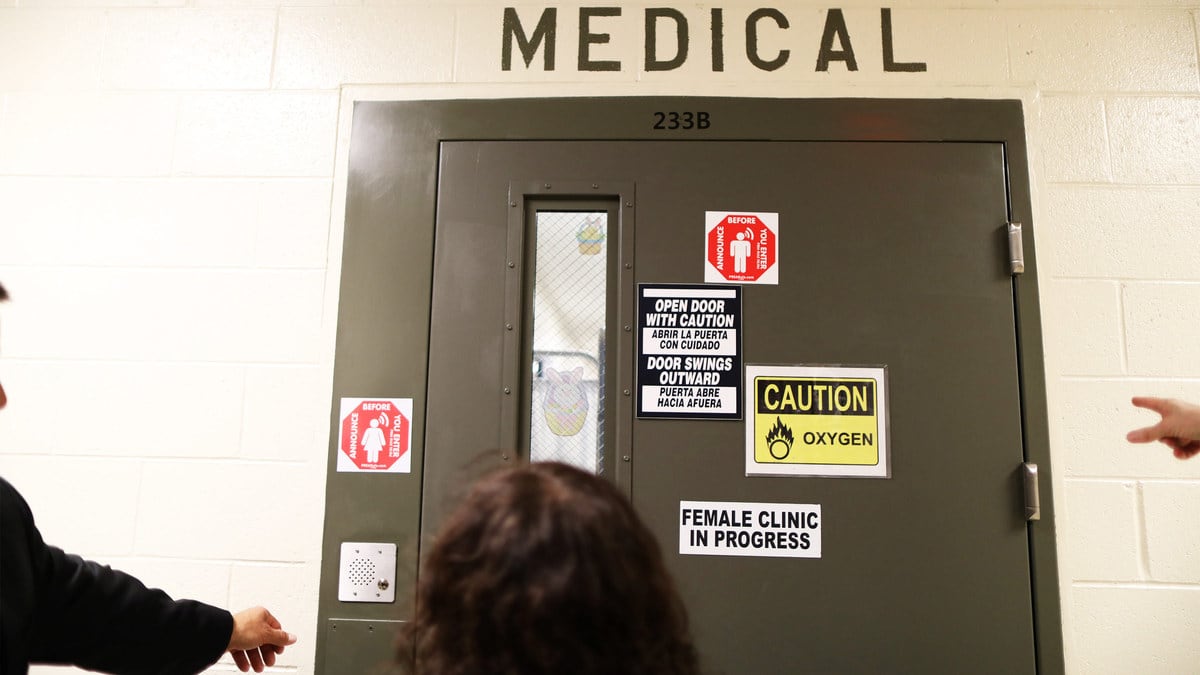A dire situation is unfolding at an Immigration and Customs Enforcement (ICE) prison in Virginia, where the vast majority of people detained have now tested positive for the coronavirus, and where guards have responded violently to protests at least three times in two weeks.
The director of Farmville, a privately run immigration detention center in central Virginia, recently stated in court papers that at least 267 people currently detained there have tested positive for the coronavirus—and the numbers may spike further, with 80 people still awaiting test results.
It took until July 2 to test all 366 detainees. Only 19 people tested negative. In addition, 22 employees of the detention center have tested positive. The detained population inside Farmville, as of Jul. 13, now totals 360 people.
Director Jeffrey Crawford’s court declaration revealed that guards at Farmville used pepper spray on detainees who had refused to assemble for morning attendance on July 1. It is the third acknowledged use of violence on Farmville detainees, who have been protesting their conditions as they watch the coronavirus spread, since June 20.
“They put us in here to let us die,” said one man detained at Farmville, whom The Daily Beast will call Bobby for his safety. Bobby, who has tested positive for the coronavirus, said another detained man asked him, “‘If we die, are they just gonna disappear us or something? They can’t do that!’ Shit, yes they can.”
Bobby described an atmosphere within Farmville of anger, fear, and even resignation. “They’re all worried, they’re like, Jesus, they’re all mad, they’re pissed off,” he said. “They’re gonna let us die here. They’re not gonna move anybody.”
The crisis at Farmville raises questions about the extent of the coronavirus within ICE detention centers, which have become vectors for the pandemic, as well as the candor with which ICE is presenting it to the public. As recently as Monday morning, ICE listed on its website 102 “confirmed cases currently under isolation or monitoring” at Farmville, despite Farmville director Crawford reporting 267 cases in a court declaration made on July 9.
That makes Farmville by far the ICE facility hardest hit by the coronavirus. The Bluebonnet facility in Texas, per ICE’s website, has 151 current cases.
Immigration detention is not criminal detention. It’s for people accused of the civil infraction of being in the country without proper documentation.
The Daily Beast previously reported on a frightening incident at Farmville, in which guards in riot gear responded to a peaceful June 22 protest by firing what ICE said was a “noise-distracting round” in a dorm housing an estimated 80 people. “I was afraid for my life at that moment,” a detainee involved in the incident told The Daily Beast.
ICE revealed that two days before, on June 20, guards had pepper-sprayed detainees amid what Crawford’s declaration called a “violent” protest.
But after both incidents, guards once again used pepper spray against detainees, Crawford stated in his declaration, which DCist first reported.
Crawford told a federal court that around 10:30 a.m. on July 1, detainees at Farmville’s Dorm 7 went into the day room instead of showing up for bunkside count. “After about 30 minutes” of officers and supervisors attempting to persuade them to assemble for count, Crawford said, “I authorized the use of pepper spray.”
Crawford’s declaration said four detainees used chairs as “weapons” against the officers, but referenced that development after stipulating he authorized the pepper spraying. The sequence of events was unclear. Some 11 detainees in total, Crawford continued, “became violent” and were taken from Dorm 7 into isolation “for disciplinary and safety reasons.”
After this article was published, an ICE spokesperson sent a statement that read, in part: "The health, welfare and safety of U.S. Immigration and Customs Enforcement (ICE) detainees is one of the agency’s highest priorities. ... Since the emergence of COVID-19, ICA Farmville Detention Center in Farmville, Virginia, has ramped up its efforts to protect and care for detainees in its custody by providing face masks, procuring additional handwashing stations and most recently, administering comprehensive testing of all detainees." ICE did not, in the statement, address the Jul. 1 pepper spraying incident.
The declaration came in response to an attempt by attorneys for people held within Farmville to free their clients during the pandemic. Crawford largely defended Farmville’s performance as the pandemic advanced. But he also shed light on an early June incident that lawyers believe touched off the explosive growth of the virus there.
In mid-April, following the recommendations of Farmville medical officer Dr. Teresa Moore, Farmville and ICE worked out a deal to “eliminate further intakes” out of concern that Farmville lacked sufficient space for quarantines should a new influx of detainees enter. According to Crawford’s declaration, the deal permitted new arrivals to quarantine in jail cells in Virginia’s Caroline County.
Yet on June 2, due to what Crawford called an “operational need,” ICE sent 74 detainees to Farmville from Florida and Arizona. The volume of detainees overwhelmed the Caroline County facility, so, despite the agreement, they came directly to Farmville. At least one detainee required hospitalization for COVID-19 symptoms. Testing showed 51 of them had the virus.
“ICE stated that there were no active COVID-19 cases at the Arizona facility and that there were very few cases at the Florida facility,” Crawford said in his declaration. Both Arizona and Florida have recorded massive spikes in coronavirus cases recently. Statistics kept by Johns Hopkins University indicate the states’ virus totals began to spike on or around the June 2 transfer date.
In late June, Bobby, who has a heart condition, felt faint and was taken to the hospital. There he tested positive for COVID-19. But he was taken back to Farmville, where he was placed in what he described as a squalid room in the medical wing with two other men. They could not keep more than four feet distance between all of them. Guards told him the previous occupants of the room had the coronavirus.
“There was spit on the floor and everything,” he said. “It was nasty. People don’t care.”
Bobby did not witness the pepper spray incident. He said the guards have “gotten better” and communicated that they “can’t do nothing about” how detainees are treated inside.
Bobby said that since he returned from the hospital with a COVID-19 diagnosis, Farmville has given him only Tylenol and his old blood-pressure medication. “My neck is killing me [and] I can’t get to sleep,” Bobby said.
In the statement, an ICE spokesperson said: "Medical checks are done twice daily, including a temperature screening and medication disbursement. Every detainee who needs medical attention is being seen. Farmville staff have worked diligently to keep detainees informed of the developing situation as it evolves through education and updates from medical staff on coronavirus symptoms and how their care and custody will be managed. "
Asked what he wanted the outside world to know about conditions inside Farmville, Bobby replied: “This is inhumane. You don’t treat humans like this. You don’t treat dogs like this. They don’t care if you die.”

